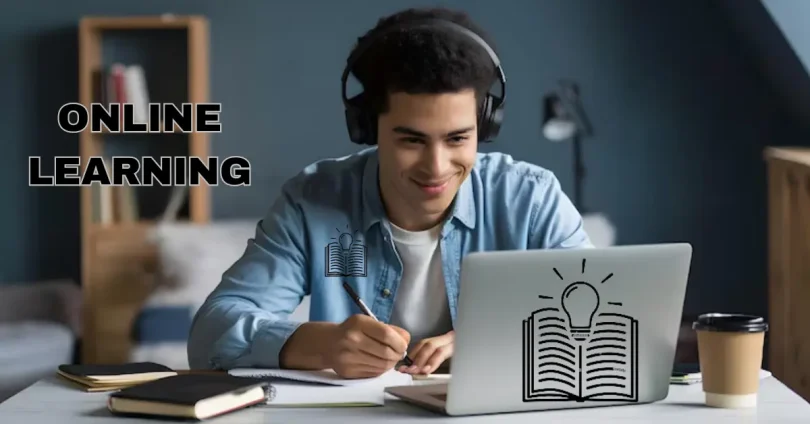Introduction:
Online learning refers to a method of education where students use the internet to study and gain knowledge instead of going to a physical classroom. It can include live classes through video calls, recorded lectures, reading materials, quizzes, and online exams. This method has grown rapidly in recent years, especially because of its ease, flexibility, and accessibility.
One of the biggest advantages of online learning is that it allows people to learn anytime and anywhere. You don’t have to travel to a school or college. Instead, you can attend classes from your home, a café, or even while traveling. This is very helpful for students who live far away from good educational institutions or for people who are working and want to study on the side.
Another great thing about online learning is the variety of courses available. Whether you want to learn English, computer programming, photography, business skills, or even cooking, there is an online course for you. Many websites and platforms like Coursera, Udemy, and Khan Academy offer courses by top teachers and universities.
Online learning is also affordable in many cases. Some platforms offer free courses, and others charge much less than traditional colleges or schools. You also save money on travel, books, and accommodation.
However, online learning requires self-discipline and motivation. Since you are not sitting in a classroom, you have to manage your time wisely and stay focused. Some students may also miss the personal interaction with teachers and classmates.
What is Online Learning?

Online learning is a method of studying where education is delivered over the internet. Instead of attending classes in a traditional classroom, students learn through digital platforms using computers, tablets, or smartphones. It includes video lessons, live lectures, e-books, interactive quizzes, and assignments that can be accessed from anywhere at any time.
Online learning can be self-paced or scheduled, depending on the course or platform. Some online courses offer certificates, diplomas, or even full degrees. It is used by schools, colleges, universities, and private institutions to make learning more flexible, affordable, and accessible for everyone.
Why Online Learning is Important

Online learning has become a key part of modern education. Here’s why it’s so important in today’s world:
Accessible to Everyone
- Students from remote areas can access quality education.
- People with disabilities can learn from the comfort of their homes.
- Courses are available 24/7, making learning flexible for all.
Flexible Learning Schedule
- Learn at your own pace—no fixed class timings.
- Ideal for working professionals or busy individuals.
- Rewatch lessons anytime for better understanding.
Cost-Effective
- Saves money on travel, books, and accommodation.
- Many platforms offer free or affordable courses.
- Access to top-quality education without high tuition fees.
Wide Range of Courses
- Learn anything—from coding to cooking.
- Courses available for school, college, job skills, and hobbies.
- Constant updates to match the latest industry trends.
Technology-Driven Learning
- Interactive tools like videos, quizzes, and forums improve engagement.
- Mobile apps allow learning on the go.
- Use of AI, virtual classrooms, and simulations for better learning.
Encourages Self-Discipline
- Helps develop time management and responsibility.
- Promotes independent learning and critical thinking.
- Students learn how to set and meet their own goals.
Global Learning Environment
- Learn from top universities and instructors around the world.
- Interact with students from different cultures.
- Get global exposure and broaden your mindset.
Step-by-Step Guide on Online Learning
Here’s a simple and easy-to-follow guide to help you get started with online learning:
1. Set Your Learning Goals
- Decide what you want to learn and why.
- Choose a subject or skill that matches your interest or career needs.
2. Choose the Right Online Learning Platform
- Popular platforms: Coursera, Udemy, edX, Khan Academy, Skillshare, etc.
- Check for course ratings, reviews, certification, and instructor experience.
3. Create an Account and Sign Up
- Register with your email or social media.
- Enroll in the course that suits your goal and budget (some are free).
4. Gather Required Tools
- You’ll need a computer, tablet, or smartphone.
- Make sure you have a stable internet connection and headphones.
5. Plan a Study Schedule
- Set daily or weekly study time according to your routine.
- Stick to your schedule to stay consistent.
6. Start Learning the Lessons
- Watch videos, read materials, and take notes.
- Pause, rewind, or rewatch lessons as needed.
7. Take Quizzes and Assignments
- Complete all tests and tasks to check your understanding.
- Don’t skip exercises—they help strengthen your learning.
8. Join Discussion Forums (if available)
- Ask questions and share ideas with other learners.
- Learn from different perspectives and stay motivated.
9. Track Your Progress
- Monitor how many lessons you’ve completed.
- Use progress bars and reports available on the platform.
10. Earn Your Certificate
- Finish all course requirements.
- Download or share your certificate on LinkedIn or resume (if provided).
11. Apply What You’ve Learned
- Practice skills in real life or work projects.
- Keep learning advanced topics if needed.
Advantages and Disadvantages of Online Learning
| ADVANTAGES | DISADVANTAGES |
| Learn anytime, anywhere | Requires strong self-discipline and motivation |
| Wide variety of courses and subjects | Lack of face-to-face interaction |
| Affordable or free courses available | Limited hands-on or practical experience |
| Access to global educators and institutions | Technical issues like poor internet can disrupt study |
| Flexible schedule suitable for all ages | Can lead to screen fatigue and distractions |
| Learn at your own pace | Not all courses are accredited or recognized |
| Saves time and travel expenses | Difficult for those without basic tech knowledge |
| Suitable for working professionals and students | Limited networking opportunities compared to physical class |
Common FAQs on Online Learning
What is online learning?
Online learning is a way to study using the internet instead of going to a physical classroom. You can watch videos, read lessons, do assignments, and even get certificates online.
Is online learning as good as classroom learning?
Yes, if you stay focused and choose the right course, online learning can be just as effective. Many top universities and experts teach online too.
Do I need a laptop for online learning?
A laptop is helpful, but you can also use a smartphone or tablet for most courses. Just make sure you have a good internet connection.
Can I get a certificate with online learning?
Yes, many platforms offer certificates after you complete the course. Some are free, and some charge a small fee.
Are online courses free?
Many online courses are free, but some advanced or professional ones may require payment. You can choose based on your needs and budget.
How much time do I need for online learning?
It depends on the course. Some courses take a few hours, while others take weeks. The best part is—you can learn at your own pace.
Is online learning good for kids?
Yes, there are many fun and educational courses designed especially for children. Parents can guide and support them during learning.
What if I don’t understand something during the course?
Most platforms have discussion forums or help sections where you can ask questions. You can also rewatch the lessons anytime.
Conclusion:
Online learning has truly changed the way we think about education. It gives everyone—from school students to working adults—a chance to learn new skills or improve their knowledge without being limited by location, time, or cost. You don’t have to travel to a classroom or follow a strict schedule. Instead, you can study at your own pace, anytime and anywhere, using a phone, tablet, or computer.
Another big benefit is the wide variety of courses available. Whether you want to learn a new language, improve job skills, prepare for exams, or explore a hobby, online learning platforms offer it all—often at very affordable prices or even for free.
While it does require self-discipline and a good internet connection, the benefits of convenience, flexibility, and global access make it a great choice for modern learners. Overall, online learning is an effective and user-friendly way to grow in your personal or professional life.
Bonus Points on Online Learning
- Learn From Experts Worldwide: Many online courses are taught by professionals from top universities and global companies.
- Replay Lessons Anytime: You can pause, rewind, and review lessons as many times as you need.
- Earn Recognized Certificates: Some platforms offer certificates that can be added to your resume or LinkedIn profile.
- No Age Limit: Anyone, from kids to seniors, can learn online—there’s no age barrier.
- Eco-Friendly Learning: Reduces paper use and travel, making it better for the environment.
- Build Digital Skills: While learning, you also improve your tech and online communication skills.
- Learn Multiple Skills at Once: Enroll in more than one course and explore different interests side by side.
- Regular Updates: Courses often stay updated with the latest trends, tools, and industry standards.







